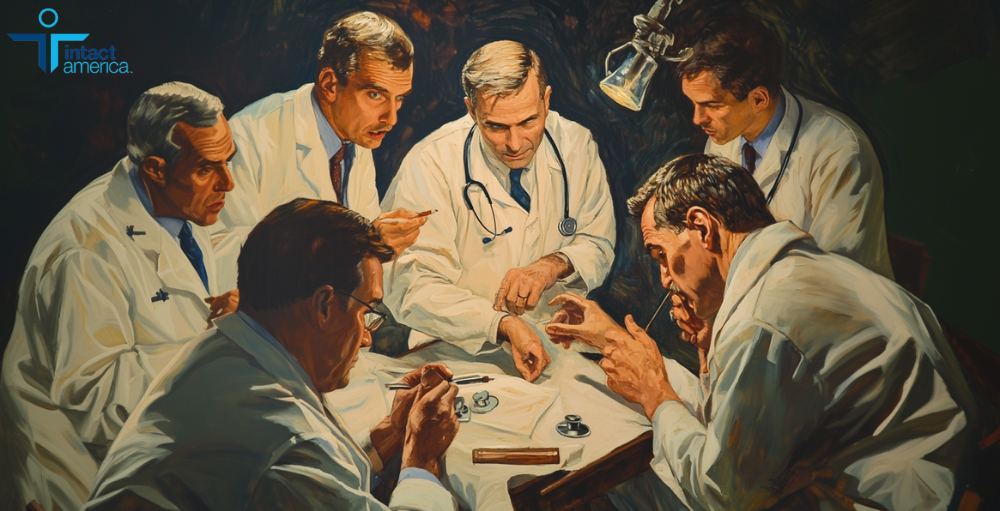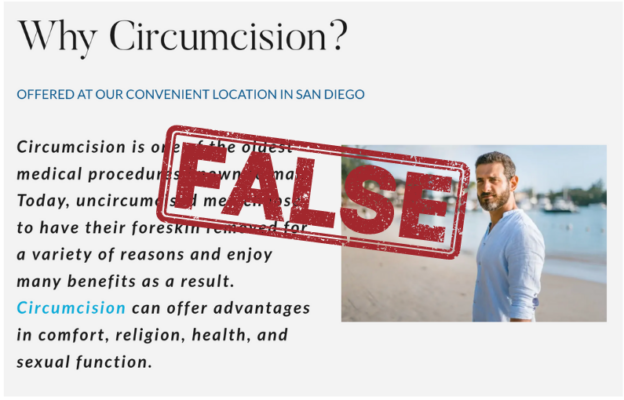
Let’s be real: Circumcision is an unnecessary, outdated procedure wrapped in cultural tradition and pseudoscience. Yet here we are, with Dr. Bidair from SoCal Circumcision pushing the same tired pro-circumcision narrative, dismissing the ethical and medical concerns while labeling those who oppose it as extremists.
But the truth is, the anti-circumcision movement is grounded in science, ethics, and human rights. It’s time to dismantle Dr. Bidair’s flawed arguments and reveal the reality behind this harmful practice.

1. Myth: Circumcision is a Simple, Harmless Procedure
Dr. Bidair brushes off circumcision as a “quick and routine” surgery with minimal risks. But make no mistake—circumcision is a surgical procedure that involves cutting off part of a baby’s body, often without anesthesia. The risks are real: excessive bleeding, infection, scarring, and even death in rare cases. To call it “harmless” is dangerously misleading.
❌ Dr. Bidair’s states that circumcision is a safe procedure with very low risk of complications.
This downplays the very real and long-term risks. Some infants suffer excruciating pain during the procedure, and many men later report reduced sensitivity and psychological trauma in adulthood.
✅ Fact Check: Contrary to Dr. Bidair’s claims, studies show that circumcision is not without risks. The Guttmacher Institute estimates the overall complication rate from circumcision to be between 2% and 20%. Complications can range from immediate issues like infection, excessive bleeding, and poor healing to long-term problems such as painful scarring, adhesions, and diminished sexual sensitivity.
This isn’t just about a quick surgery. It’s about violating bodily autonomy by subjecting infants—who cannot consent—to an irreversible procedure that’s not medically necessary.
2. Myth: Circumcision Prevents Infections and Disease
Dr. Bidair claims circumcision is a preventive measure against infections, UTIs, and even HIV. This is exaggerated and misleading. Proper hygiene and safe sex practices are far more effective without the need to cut off a healthy body part.
❌ One of his most outrageous claims is that circumcision is one of the most effective ways to prevent sexually transmitted infections.
This ignores the fact that condoms and safe sex education are far more effective in preventing STIs than circumcision. Removing the foreskin isn’t a magical solution.
✅ Fact Check: Condoms, according to the CDC, reduce HIV transmission risk by over 90%. Circumcision as a “preventive measure” is absurd. Circumcision offers a very modest reduction in risk—primarily for specific populations in certain regions of the world where HIV prevalence is exceptionally high. In developed countries, however, the benefits of circumcision as an STI prevention method are marginal.
If we start removing body parts to prevent infections, why not perform appendectomies at birth to avoid appendicitis?
“The glans at birth is delicate and easily irritated by urine and feces. The foreskin shields the glans; with circumcision, this protection is lost. In such cases, the glans and especially the urinary opening (meatus) may become irritated or infected, causing ulcers, meatitis (inflammation of the meatus), and meatal stenosis (a narrowing of the urinary opening). Such problems virtually never occur in intact penises. The foreskin protects the glans throughout life.” – From Please Don’t Cut the Baby! by Marilyn Fayre Milos, quoting Edward Wallerstein, author of Circumcision: An American Fallacy
3. Myth: Circumcision is an Ancient, Cultural Tradition
Dr. Bidair argues that circumcision has been practiced for centuries as if tradition alone justifies it. This reasoning is flawed and dangerous. Cultural practices should never override the right to bodily autonomy.
❌ He claims that circumcision has been practiced for thousands of years, so it must be valuable.
Just because something is ancient doesn’t mean it’s right. We’ve abandoned many harmful practices—bloodletting, foot-binding, slavery—despite their long histories. Circumcision belongs in the same category.
✅ Fact Check: The World Health Organization recognizes that many traditional practices continue today, despite being harmful and unethical.
An ancient practice does not equate to a morally or medically sound one, especially when it involves irreversible surgical procedures performed on those who cannot consent.
4. Myth: Anti-Circumcision Advocates Are Extremists
Dr. Bidair paints anti-circumcision advocates as radical extremists who guilt-trip parents into not circumcising their children. In reality, the anti-circumcision movement is grounded in protecting bodily autonomy and ensuring parents make informed decisions.
❌ He states that intactivists try to make parents feel guilty for choosing circumcision.
This couldn’t be further from the truth. Anti-circumcision advocates simply want parents to have all the facts, not just the biased version Dr. Bidair presents.
✅ Fact Check: Many medical experts, including those from Doctors Opposing Circumcision, argue that circumcision is medically unnecessary and ethically questionable. This reinforces the need for fully informed, balanced decision-making rather than pushing one-sided narratives or promoting circumcision as a standard medical practice.
Protecting a child’s right to bodily autonomy isn’t radical—it’s rational.
5. Myth: Circumcision is “Cleaner”
Dr. Bidair continues to push the outdated cleanliness myth, claiming circumcised men have fewer hygiene issues. But the reality is, proper hygiene habits—not surgery—are what keep people clean. Foreskin is not a defect that needs to be removed.
❌ He claims circumcision reduces hygiene issues and keeps infections at bay.
This is rooted in cultural bias, not medical science. Foreskin is a functional part of the body, and proper hygiene can prevent infections without cutting it off.
✅ Fact Check: Medical professionals, including experts from Doctors Opposing Circumcision, emphasize that the foreskin is naturally designed to stay clean and healthy with minimal effort. As with any other body part, such as hands or ears, proper cleaning is the key to maintaining health.
We don’t amputate parts of the body because they require cleanliness—so why is the foreskin treated differently? This logic reveals the cultural and social biases that continue to drive unnecessary circumcision practices.
6. Myth: Circumcision Has No Lasting Effects
“Research has shown that circumcised men suffer from alexithymia (impaired ability to identify and describe one’s emotions) at rates 20 percent higher than intact men and are up to 4.5 times more likely to be diagnosed with erectile dysfunction than their intact peers.” – This Penis Business
Dr. Bidair conveniently ignores the long-term consequences of circumcision, claiming it has no impact on sexual pleasure or well-being. This is false. Many men report physical and psychological damage from circumcision, particularly when they realize they never had a choice.
❌ He writes that there are no significant long-term effects of circumcision on sexual function.
This completely disregards the reality for many men who experience reduced sensitivity and sexual dissatisfaction.
✅ Fact Check: “Circumcised men are 4.5 times more likely to be diagnosed with erectile dysfunction (ED).” – via International Journal of Men’s Health. Many men report a noticeable reduction in sexual pleasure, and the psychological impact of having no choice over a permanent alteration to their body can be profound.
Conclusion: Circumcision is Unnecessary, Outdated, and Ethically Wrong
Dr. Bidair’s arguments in favor of circumcision are built on outdated beliefs, misinformation, and a disregard for bodily autonomy. Circumcision isn’t about health—it’s about culture, convenience, and maintaining traditions at the expense of human rights.
The anti-circumcision movement isn’t extreme—it’s about protecting the fundamental right to make decisions about your own body.
Circumcision is an irreversible, permanent procedure. It should be an individual choice, made by the person whose body is being altered—not by doctors or parents.
It’s time to stop making decisions for others’ bodies. Circumcision is a choice—but it should be their choice, not yours.
Read more stories in our Voices column at http://www.intactamerica.org.






Gene Wayne
January 11, 2025 1:05 pmCircumcision is definitely better. I did it at age 21 and never looked back or regretted it. You lose no sensation as established by Masters and Johnson on their extensive studies, and it was much easier to keep clean. I would definitely do it again.